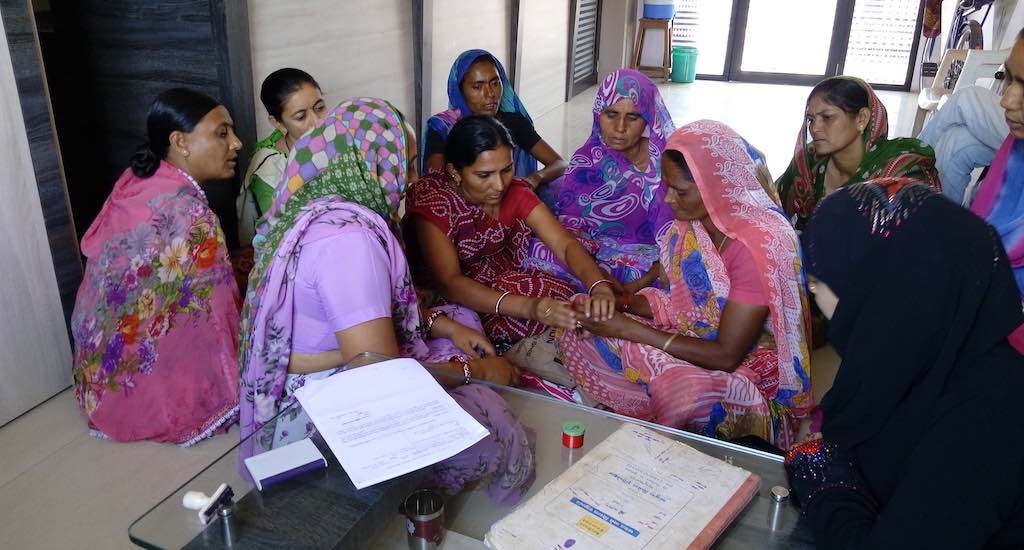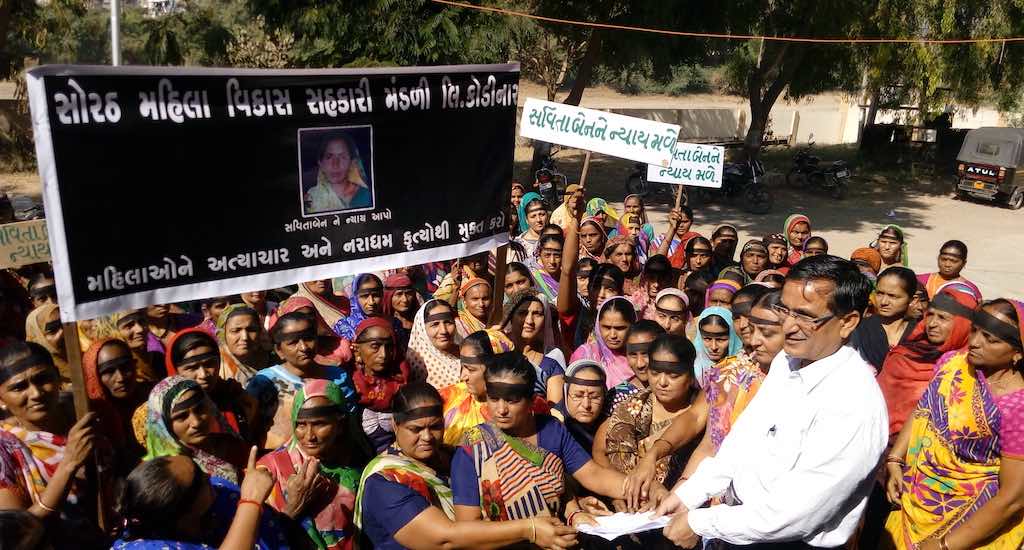How One Women-Run SHG Helped 500 Widows Across 68 Villages in Less Than 4 Years
Women of self-help groups in the Gir region of Gujarat are going beyond microfinance to fight social taboos about widows to helping them lead a better life. Palak Gosai takes a closer look.

“It was time to break the silence against the social evil. We announced that widows would not wear black to please the regressive society we live in,” 39-year-old Motiben said in a resolute voice. Motiben’s voice echoes the sentiments of many women within the Sorath Mahila Vikas Mandali (SMVM), an umbrella organisation connecting nearly 500 self-help groups (SHGs).
A group of women from Kodinar block in Gir Somnath district of Gujarat came together in 1999 to form a self-help group with the support of Ambuja Cement Foundation.
The SHG was started with the objective of encouraging women to get into the habit of saving. The savings were pooled and used for internal lending among members and for clearing bank loans, if any.
But with a plea for help from a young widow, the group transformed into a platform to get rid of meaningless stigmas and ensure social equity and justice to widowed women.
Fighting stigmas
In the southern part of Gujarat where Gir Somnath district is situated, widows are mistreated and are expected to be in perpetual mourning. They are compelled to wear black dresses and are ostracised from auspicious ceremonies.
Seeking new horizons beyond their regular activities, the women decided to work on overcoming the hurdles widows women faced.
The communities in Kodinar include Kharva, Kodi, Kumbhar, Karadiya Rajput, Dalit, Darbar and Ahir, among others. The women of SMVM put aside the caste divide and united to focus on social equity and justice for women.
The revolutionary change began when Rasilaben from Malgam village lost her husband in a bus accident when she was 24 years old. As an SHG member, she sought the mandali’s help.
Women from SMVM visited her and presented her with a colourful saree, bangles, nose ring and bindi; everything that is strictly prohibited for a widow according to social customs.

“Doesn’t she have an equal right to live like you and me? Happily? It’s time that women are given their basic rights as fellow human beings. We cannot tolerate the injustice meted out to widows,” 55-year-old Jayaben, a proud member of the mandali told VillageSquare.in.
Respect for widows
In 2011 they started the Widow Recognition Program, a social protection initiative.
The first joint decision by the women was that there would be no room for caste, community and denominations.
They started creating awareness among villagers about giving widows due respect and equality in society. They motivated the family members of a widow to help her lead a normal life.
Overcoming this social evil was not an easy task as the community was reluctant to accept the changed attitudes immediately. The members received allegations and accusations from the community. The charges never deterred them from addressing the issue.
They continued their efforts through rallies, community meetings, awareness camps and house visits.
It took four years to see results. The mandali has helped more than 500 widows lead a normal life, with the acceptance and support of communities across 68 villages.
Social security for widows

After ensuring social equality and justice for widows, the SHG formed Sorath Mahila Suraksha Kavach Yojna to give them social security.
Most often the widowed women in rural areas face severe hardship due to lack of sources for regular income and find it difficult to sustain their families.
All the SHGs which are members of SMVM contribute Rs 1,000 annually from their savings. With this money, a fund has been created to help widows who are in need of assistance.
The efforts have resulted in a fund of Rs 1,00,000 which the women strive to increase. SMVM has started helping needy widows and provided cheques worth Rs 11,000. The members believe that in future they will be able to provide economic assistance up to Rs 51,000 to destitute widows.
Collective power of women
With more than 6,000 women members in 484 SHGs and their savings ranging from Rs 300 to Rs 5,000 per month as per their capacity, crossing Rs 10 million, SMVM remains a strong platform.\
Sorath Mahila Vikas Mandali’s is a voice of its women in unison against social discrimination. Theirs is a journey of hardships and lessons that conveys the necessity to identify and address the problems women face in our society.
Their journey also conveys how the collective power of women can bring about progressive change and transform lives.
Palak Gosai is Documentation and Communication Officer at Coastal Salinity Prevention Cell, a non-profit organization based in Ahmedabad, Gujarat. Views are personal.
Adapted from an article originally published on VillageSquare.in. Subscribe to VillageSquare’s weekly update on the website for more stories from rural India.
Like this story? Or have something to share?
Write to us: [email protected]
Connect with us on Facebook and Twitter.
NEW: Click here to get positive news on WhatsApp!
If you found our stories insightful, informative, or even just enjoyable, we invite you to consider making a voluntary payment to support the work we do at The Better India. Your contribution helps us continue producing quality content that educates, inspires, and drives positive change.
Choose one of the payment options below for your contribution-
By paying for the stories you value, you directly contribute to sustaining our efforts focused on making a difference in the world. Together, let’s ensure that impactful stories continue to be told and shared, enriching lives and communities alike.
Thank you for your support. Here are some frequently asked questions you might find helpful to know why you are contributing?


This story made me
- 97
- 121
- 89
- 167











